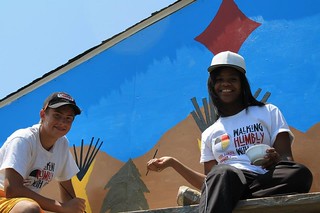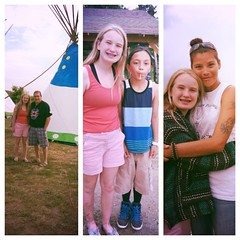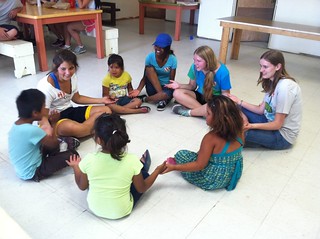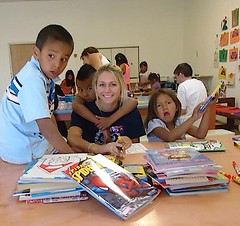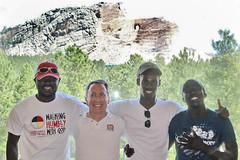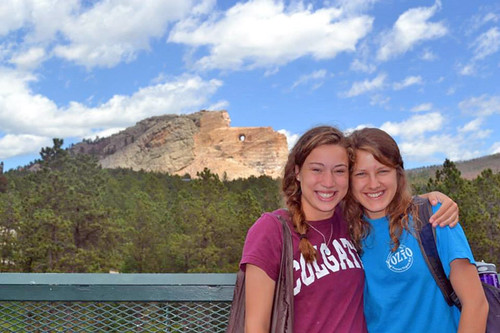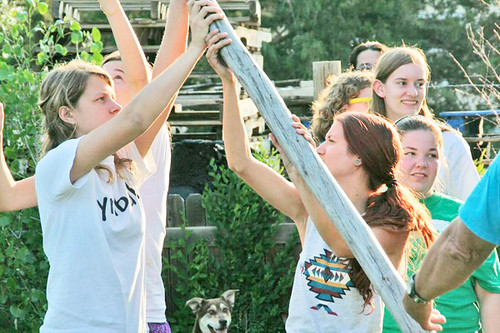October 31, 2013 in Communications, Congregations, Faith in action, News, Youth
Making a Difference, One Life at a Time
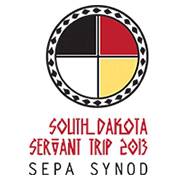
In late June, 111 Lutherans traveled halfway across the country to be of service to descendants of an ancient culture. Eager to make a difference in whatever ways they could, these youth and adults arrived east of Rapid City, South Dakota at Rosebud Reservation, home to the Lakota tribe.
The group—representing 19 churches of the Southeastern Pennsylvania Synod of the Evangelical Lutheran Church of America—spent the weekends before and after their reservation experience in Rapid City, living in the parish hall of South Canyon Lutheran Church and bonding as a group, while visiting local attractions. But the intervening weekday work days are the ones they truly cherish.

Youth work on a construction project. See a slideshow from the South Dakota trip at the bottom of the page.
The 12-day servant trip takes place every three years and originated in 2004 as the dream of Molly Beck Dean, assistant to the Bishop and youth ministry specialist for the synod. Raised in North Dakota, Dean recognized a lack of understanding of Native Americans among the people of southeastern Pennsylvania, and decided that first-hand experience for the youth of the synod was the way to educate the larger community.
“Our faith calls us to serve others, and with this trip, I know we will always be blessed as much as we are a blessing,” Dean said. “Our volunteers do whatever is asked of them with an enthusiasm that makes up for any lack of experience.”
From working in a day camp in the village of Two Strike, to painting the home of the local medicine man outside of Mission, S.D., and everything in between, the servants let their faith guide them as they applied elbow grease and good humor to their daily tasks. Tree of Life, a Methodist relief organization based in Mission, was their host. On this trip, one contingent traveled further east, to Milks Camp, where they lived in primitive conditions—even sleeping in tipis—while helping to create a camp for Native American youth and families.
The group at Milks Camp experienced a very deep connection to the Lakota as they lived and worked closely with the same family for five days.
“I found it easier to connect with the culture because of the (four) kids I spent so much time with,” said Callum Malcolm, 15, from Trinity Lutheran Church in Perkasie.
“I talked with them a lot and they helped me understand the Lakota nation and their traditions. At the end, I felt more similarities than differences—something I never expected to feel.”
Forming these deep relationships quickly in such an isolated area is something she will always remember, agreed Emily Thomas, 15, also from Trinity. “Over the course of the week, I came to understand the impact of this trip. It expanded my horizons and I will always remember it and the people we grew so close to.”
First-time participant Flora Ferraz, 19, of Holy Communion Church in Philadelphia, worked with the group that spent each day with children in the day camp of Two Strike, and discovered she has a lot to be thankful for.
“A lot of what I saw there was really sad, what these young children have to go through—many didn’t have shoes and wore the same dirty clothes every day. And it showed me not to take what I have for granted,” said Ferraz. “I learned to be patient, to be thankful and to be humble. It was an incredible experience, and I thank God for it.”
“I’m proud of the work we do and the difference we make for the kids of Two Strike,” said Elizabeth Kinder, 22, coordinator of the day camp committee, after her third trip to South Dakota. “But then we leave them and go back to our own lives. We wish we could stay forever, and we only hope we’ve made as much as an impact on them as they’ve made on us.”
This year’s theme—Walking Humbly With God—was prophetic, as throughout the week, participants were called on to put their own wants and needs aside to tend to those of others. Lack of sleep, familiar food and other comforts of home combined to challenge them all.
One adult leader even gave a little girl at day camp her shoes, when the child showed up barefoot, walking across hot pavement littered with broken glass and other debris.
“I’ve done mission trips before, but I really feel a true transformation [after this one],” said Steve Keiser, pastor of Holy Communion Church in Philadelphia, who traveled with five youth and young adults from his congregation.
“I felt incredibly proud of the spiritually grounded, energetic and enthusiastic young people of our synod, how they quickly got to know each other and got down to work. It was physically and emotionally challenging, and I’m grateful to have had that personal challenge.”
Keiser said he intends to keep the lessons of Rosebud alive by encouraging members of his congregation to continue to extend themselves in service to people who are different. “That’s how you keep the spirit of the trip alive. You don’t become complacent. You continue to find opportunities like this trip to serve people.”
Groups like SEPA are vital to the Tree of Life Ministry, which has built a partnership with tribal leaders under the guidance of minister Russell Masartis and his wife Donna, directors there for ten years. In addition to making home repairs, the agency operates community centers and works with local churches.
Tree of Life’s Warm Welcome Center serves hundreds each day, providing free meals and, for a modest fee, clothing and bags of food to take home. Masartis said that each interaction between volunteers and residents of the reservation help create a better future, breaking down racial divides and ending discrimination.
As hard as the group members tried, understanding the extreme poverty and substance abuse experienced on the reservation was difficult to accept. In spite of these deprivations, the youth discovered the love of life exhibited by the Lakota.
“They taught us so many simple, yet striking messages about the beauty of life and how we need to love each other, forgive and stay strong through the challenges we encounter,” said Lizzy Cooper, 18, of St. Paul’s Church in Exton. “Life’s challenges are put in front of us for a reason, and we all have the opportunity to come out stronger and more inspired, loving and experienced in the end.”
Steph Diewald, 18, also of St. Paul’s, befriended a young girl of about 10, at the home she worked at for two days, painting and making minor repairs.
“The first day, she came out with 11 tiny kittens and then later spent time talking to me,” remembered Diewald. “She told me that her father had been in jail for seven years and her mom for two—because she turned her in for driving drunk. Wow! The concept of the hardship of this girl’s life really hit me, nearly surpassing my understanding.
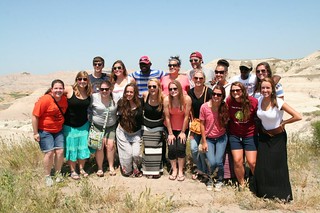 “I realized then that what we were seeing was not just a house that was falling down; her whole life was turned upside down, because of the poverty and the awful situation she was born into. But when we left, she gave us all hugs and she was just another smiling little girl who wants to be listened to and loved,” added Diewald.
“I realized then that what we were seeing was not just a house that was falling down; her whole life was turned upside down, because of the poverty and the awful situation she was born into. But when we left, she gave us all hugs and she was just another smiling little girl who wants to be listened to and loved,” added Diewald.
Learning about Native American culture; gaining self-reliance and self-esteem through hard work; facing down physical and emotional challenges; and making new friends are all elements of the trip the youth and adults, alike, carry home with them.
Brenda Lange is a freelance writer based in Philadelphia. www.brendalange.com
